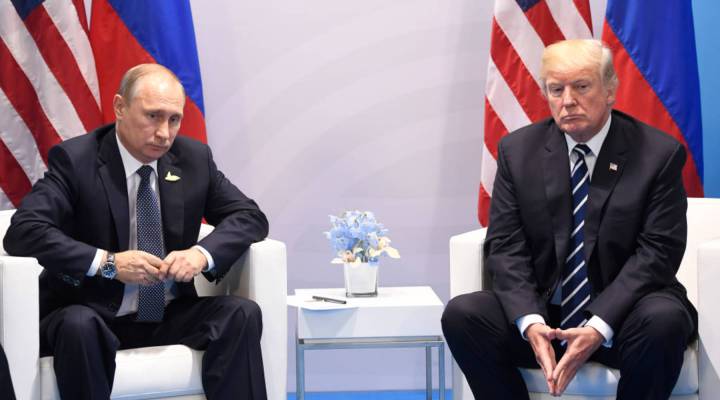
Why the sanctions bill against Russia is controversial

In a rare moment of bipartisan support, the House of Representatives voted overwhelmingly in favor of new sanctions on Russia, Iran and North Korea. But while the proposed sanctions bill will likely pass the Senate, President Donald Trump may veto the measure.
Ian Bremmer, president and founder of the Eurasia Group, joined us to talk about why certain industries are against the measure, why both Democrats and Republicans happen to be on board with it, and the fear that exists over North Korea’s nuclear’s capabilities. Below is an edited transcript.
David Brancaccio: So first on the Russia part of this sanctions package — why are these sanctions seemingly so controversial for companies that might be drawn into this net?
Ian Bremmer: Well, you had some energy companies that specifically felt this was going to limit their ability to continue to do significant business. It’s one of the places where the Americans do have real economic exposure, and that’s why we ended up getting some changes in the final bill between the House and Senate.
Brancaccio: Europeans are pretty grumpy about this. They felt they were not consulted. They’re worried about their own companies getting drawn in.
| Russian election interference is more widespread than thought, Bloomberg reports |
| Three things you need to know about the U.S.-Russia relationship |
Bremmer: They were not consulted and the Germans, in particular, Angela Merkel — absolutely no fan of Putin, but the industrial lobby in Germany has a hell of a lot more exposure to Russia than anyone in the United States.
Brancaccio: And so there’s potential for even more friction there, if the White House goes along with this. Care to handicap that possibility?
Bremmer: I suspect they will support it, because this is well beyond veto-proof in terms of the size of the majorities in the House and Senate that are in favor of this bill. What’s so interesting is that the Trump administration made very clear they didn’t want to see this move ahead. And both the House and the Senate controlled by Republicans said very clearly, Mr. Trump, we do not trust you to actually support the American national interest in dealing with Russia. It’s quite something to see that. And it is going to undermine the U.S.-Russia relationship in a big way, despite what Trump wants. Putin’s response will, of course, be very interesting.
Brancaccio: And what will you be looking for in that regard?
Bremmer: Well, we know that President Putin and the Kremlin were involved in hacks against not just the Democratic National Committee during the elections, but also the Republican National Committee now. None of that information was disclosed, but if suddenly a Republican-led administration is really irritating the Russians, you mean to tell me that their information is going to be sacrosanct? Absolutely not. And I’d be very interested to see Trump’s response when we start seeing that Republican dirty laundry, involving perhaps the administration members themselves, starts getting leaked through WikiLeaks from the Russians.
Brancaccio: This package of sanctions is not just targeting Russia — there’s also Iran and North Korea. More missile tests, right?
Bremmer: Yeah. More missile tests, more ICBM tests. The big news on North Korea in the last 24 hours is that the United States government is changing its estimates of when North Korea would be able to put a nuclear weapon on top of an ICBM. From four years to now thinking within one year. In other words, an issue that if the Trump administration is going to deal with it, going to really stop them from having that capability, he’s going to have to get on it. And that means either negotiations — that so far the Trump administration has shown no inclination towards doing — or somehow they push the Chinese, and I don’t think the Chinese are going to be pushed. Some people say that there’s the possibility of direct preemptive U.S. military strikes in that situation. Even the National Security Advisor H.R. McMaster has made private comments to that end. But it’s really hard for me to see a plausible U.S. military strategy here.
There’s a lot happening in the world. Through it all, Marketplace is here for you.
You rely on Marketplace to break down the world’s events and tell you how it affects you in a fact-based, approachable way. We rely on your financial support to keep making that possible.
Your donation today powers the independent journalism that you rely on. For just $5/month, you can help sustain Marketplace so we can keep reporting on the things that matter to you.












